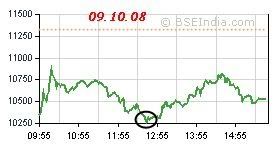Then slowly, the reality hit the aam admi as well as the not so aam admi in the form of back breaking inflation for which this man acting as Finance Minister kept on blaming global situation and everything and everyone but his own mismanagement. This was followed by the crash in the Stock Exchanges and finally by the huge reduction in Industrial Production reflected in the IIP.

Even now, this man Chidambaram is in the denial mode and keeps on spinning fictional stories to calm the common man. It is doubtful if he on his own can come out with any worthwhile action plan to provide succor to the suffering millions. More likely it is that under the garb of reviving the slump in activity, he may just focus on giving steroids to his favorite housing sector so that they can sustain their price levels which are crashing now. He will also do his best to ensure that the Stock Exchange Indices rise, once again giving everyone a false sense of euphoria that the country is making progress.
Hard times are coming and the people themselves will have to find ways to deal with the developing situation as the Government that has lost all credibility cannot be relied upon any more.
Some practical thoughts on some ways to handle the present situation which is becoming more difficult are given below.
These suggestions are not for:
Those who are blessed with means far more than what they need
Those who know what is best for them
Those who think they know what is best for them
Investing money
1. Keep away from the stock markets. Do not buy shares in a bear market for the present. The prices of shares are a complex result of many factors:
a. The actual situation of a company
b. The actual situation of a specific sector and the entire economy
c. The expectations for the future with regard to the company, the sector and the overall economy
d. The sentiment of the investors which also takes into account global factors
e. The activity of FII (foreign institutional investors), which is a key factor influencing price movements. The FIIs may park their funds temporarily in the Indian sock markets or may be ‘hit and run’ players out to make a quick buck or may invest for speculative purposes. Some FIIs who might have invested for medium-to-long term may suddenly exit for any number of reasons including exchange rate changes, their own distressed conditions or more profitable avenues in other countries.
f. Domestic speculators and market players who may work with specific objectives and influence price movements even during a particular day.
The chart below shows the huge price movements on a single day in Sensex.

Do you have the wherewithal to track the market fluctuations every hour, every day and sustain variations of 1000 points in a single day?
2. If you have money to invest, place the same in a Fixed Deposit in a nationalized bank after comparing the rates offered by a few banks as well as the penalty or loss of interest in case of early withdrawals. Investing in Gold would be the second option. Do not go under any circumstances for Multi Level Marketing Schemes which promise fancy returns for making certain members and carrying forward the chain.
3. Do not purchase a house at the present time when the market is crashing. Defer purchase. Consider the fact that the prices have gone up in the last three years by 350-400% which can not be justified on any grounds at all. The prices have been propped up just as the Sensex. (read article here for a background). The Realty Sector is facing hard times with buyers having disappeared. The Rentals in large cities are also dropping fast as the demand for rental places from domestic or international companies particularly in financial services and other service sectors is drying up. Many major builders are facing financial distress and are unable to meet their commitments. The shares of major Realty Companies have dropped between 75 to 90% since January, which shows the realities. Considering all these factors, it is advisable to KEEP AWAY from buying a house for the time being but keep a watch on the market to buy in case the market begins to rise due to Government policies that have enabled the builders to raise the prices artificially in the past. Buyers’ resistance is necessary to bring the prices down to a realistic level which is broadly 50% of the current levels.

4. DO NOT take a loan to buy a house even if the interest rate goes down. Your loan is what actually fuels the rise and helps the builders to increase their prices artificially. A Housing Loan creates a demand at a price which is not justifiable. Remember that what is really important for the person who takes a loan is not primarily the interest rate but the principal sum that is borrowed. It makes little sense to gain a small advantage in interest rate if the sum borrowed is too large to service. The borrower ends up paying higher interest in absolute terms, the interest saving is gone and more amount is borrowed to finance the unwarranted profits of the builder. This is only one aspect relating to taking a House Loan. The second and more important aspect that affects you for the entire life of the loan is servicing of the loan and interest i.e. EMI. Housing Loans have to be normally repaid over a period of 20-30 years. The borrower has to have a perspective of the entire period of the loan. The longer the period, the greater the uncertainties. Consider that a young professional couple engaged in a service industry and earning a very decent combined income takes a loan. Typically, most of the income of one partner is utilized for paying the EMI to the bank. For successfully servicing the loan, it is necessary that the same comfortable income situation continues for a period of 20 years or more. Most housing loan borrowers taking an optimistic view of the future assume that in normal conditions, they would continue to service the loan over this long period. Is it possible to predict the future over such long time horizon? Is it safe to assume that the conditions would be normal throughout? Will there be no business cycles? Everyone must have become aware that surviving in the fiercely competitive globalised world is becoming an increasingly demanding task. Job security cannot be taken for granted. Whether it is the general economic conditions or the situation of a particular employer or the ability of the employee to perform better or worse relative to others, the uncertainties have grown as much as opportunities. While the decision to take a housing loan should not be influenced by pessimism, but certainly, optimism needs to be balanced by practical considerations, prudence and caution. In our typical case, if for some unfortunate reason one partner loses the job or is required to look after family responsibilities, how would the loan be serviced? In the anxiety to get a house, many borrowers would take a view “we shall see” or “we will manage”. If that happens, all to the good. If the situation cannot be managed and if there are loan defaults and distress when children are at a critical stage in their own career development, how would the situation be resolved? Extensions in EMI installments could be obtained only at a heavy cost, further aggravating the problems. It must also be remembered that in case of defaults in loan servicing, there can be a voluntary repossession or forced repossession. In either case, the consequences can be unpleasant. While the house is repossessed, the liability for the loan still remains. Everyone has seen the disastrous effects of an economic downturn. In USA, many owners who could not make the payments simply abandoned their houses and left. The genesis of the sub- prime crisis in the USA that has had reverberations all over the world and has virtually brought the entire developed world on its knees lies in defaults in repayment of loans taken by individual borrowers. It would be unwise to ignore what is happening before our eyes and which is greatly affecting everyone at this point in time.

 Weigh the factors carefully
Weigh the factors carefully
Normal Expendiure
1. Do not use credit cards to buy things unless you have money in the account. Do not buy with credit cards to spend tomorrow’s income today. Credit cards are convenient as they enable you to make cashless purchase and avoid hassles with handling cash. This must be taken as their limited purpose. Going on a shopping spree on the strength of merely a Credit Card not backed by money in the bank, is financial irresponsibility. To spend today out of future income is to leave that much less for the future. Further, many credit card owners simply pay the minimum amount payable to continue the Card and let the bills pile up. This has a heavy cost in terms of delayed payment charges and penalties collecting of which has become a fine art with the credit card providers. The more the penalties and delayed payment charges, the less money is left for genuine needs. There are many who believe that the more Credit Cards they have, the better off they appear to be in their own esteem and in the eyes of others in front of whom the cards are flashed. This is not true. You need only one good Credit Card or Debit Card to see you through most situations, unless of course, you are defaulting by turns on the many credit cards you collect. Then again, there is a cost to having a credit card which can be easily avoided. Before deciding on the Credit Card to take, it is also advisable to know their charges and penalties policy in advance. Avoid Net Banking unless you are thoroughly familiar with the pitfalls and are able to secure yourself completely against fraud.
2. Do not take any bank or private loans to buy durables, cars, houses, etc. The future is uncertain. Do not buy if you do not have the means to buy today.
3. When buying gadgets, durables or cars, look for the basic functionalities which you require. Any added features that are offered in different models or by different brands need to be compared with the higher price that you may need to pay. Only you can decide whether a particular added feature is actually needed and whether it is worth the price differential. In Metro cities, buy a car only out of necessity, not just for comfort or as luxury or status symbol. The availability of parking places for cars whether in the place of residence or on the roads is woefully stretched and will get worse. There is also an increasing tendency to buy Laptop computers in preference to the Desktop. When you buy a Laptop, you end up paying around 50% more compared to a Desktop, feature-for feature. Buy a Laptop only if you really need it and a Desktop will not do the work. Many branded Laptops have serious servicing issues and the service is oftentimes shoddy and slow. Again, if you are used to traveling with the Laptop and it is stolen or lost, apart from the Laptop itself, you can lose large data created after hundreds of hours of work, unless you routinely back it up on a Desktop.
4. Avoid posh hotels and restaurants where you end up paying atrocious prices just for the ambience and for the pleasure of being seen in such places. Go to more moderately priced restaurants serving quality food at the same time. Try to discover the pleasures of cooking more often at home.


5. Mobile Mania: As in the case of other gadgets, pay only for the features you actually need. Do not be lured into frequently buying new models when your existing mobile exactly does what you need it to do. Avoid getting tempted to go in for various schemes which the service providers constantly keep on pushing through telemarketing at all hours. Remember, for any scheme that they propose as a favour to you, the idea is simply to fix your bill amount at a certain level so that it generates a regular minimum income to them from you. Avoid using the SMS service to send various comments to TV channels over their 5xxxx numbers. Do they care for what you say? It is simply a revenue sharing arrangement between the provider and the TV channel as these SMS are charged at a higher rate. Avoid SMS quizes to win huge prizes for answering simple questions. They are just meant to increase the revenues of the service providers. The more you SMS, the more you spend. Even if the mobile is handy, do not be tempted to talk or call someone or the other unless you really NEED to.
6. Gift Mania: Use your discretion about giving gifts. Do not indulge in needless gift culture by giving gifts indiscriminately. Avoid celebrating Husband’s, Wife’s, Father’s, Mother’s, Brother’s, Sister’s, Teacher’s, Lover’s, Hater’s or Friend’s Days. These are just meant to generate sales for vendors of gifts and cards. The sentiments towards your near and dear ones can be expressed at every opportunity and having a particular day to celebrate for the same is unnecessary.
7. Mall Mania: Malls are pleasant places to shop and pass time with your family on holidays. However, when going to a Mall, take a shopping list with you and buy only what you need and what is there in your shopping list. The shops in the Malls are very adept at using scientific techniques of merchandising and display. The primary intention is to lure and tempt you into impulse buying and somehow make the visitors spend more and more. Do not buy simply based on impulse when you see an article which you do not need. Go home, think, decide whether that article is worth buying and then buy it the next time.
8. Avoid Multiplexes. There is little need to pay 100% higher prices when you can see the same movie in a normal cinema hall which also is quite modern.
9. In general, look to get VALUE FOR MONEY whatever you buy, whether products or services.
10. Take up jobs in your own town or other town where you have a place to stay on a permanent basis. At any rate, avoid Metro cities tempted by somewhat higher salaries. The poor level of infrastructure in these cities makes for harsh living conditions apart from the physical traveling distances and lack of permanent accommodation.
While most of those who read these suggestions may find them mundane or unnecessary, they are given in the hope that a small minority may find them useful. These suggestions do not call for any real 'sacrifice', just for sensible use of what you have. In any case at the end of the day, it is for the people to think deeply and use discretion based on common sense and their own prudent thinking and in the light of their own realities.
If the article is useful, forward to others.


